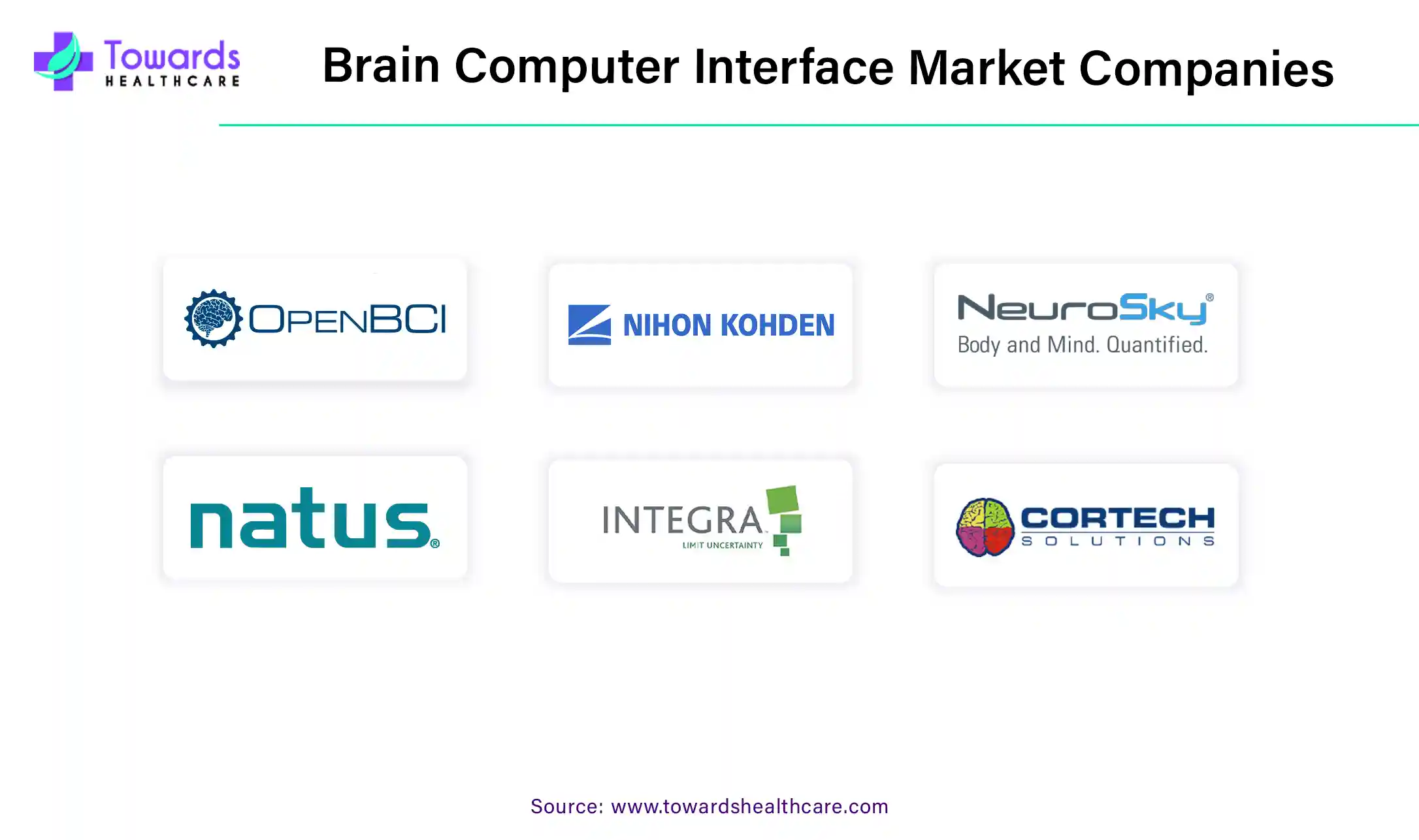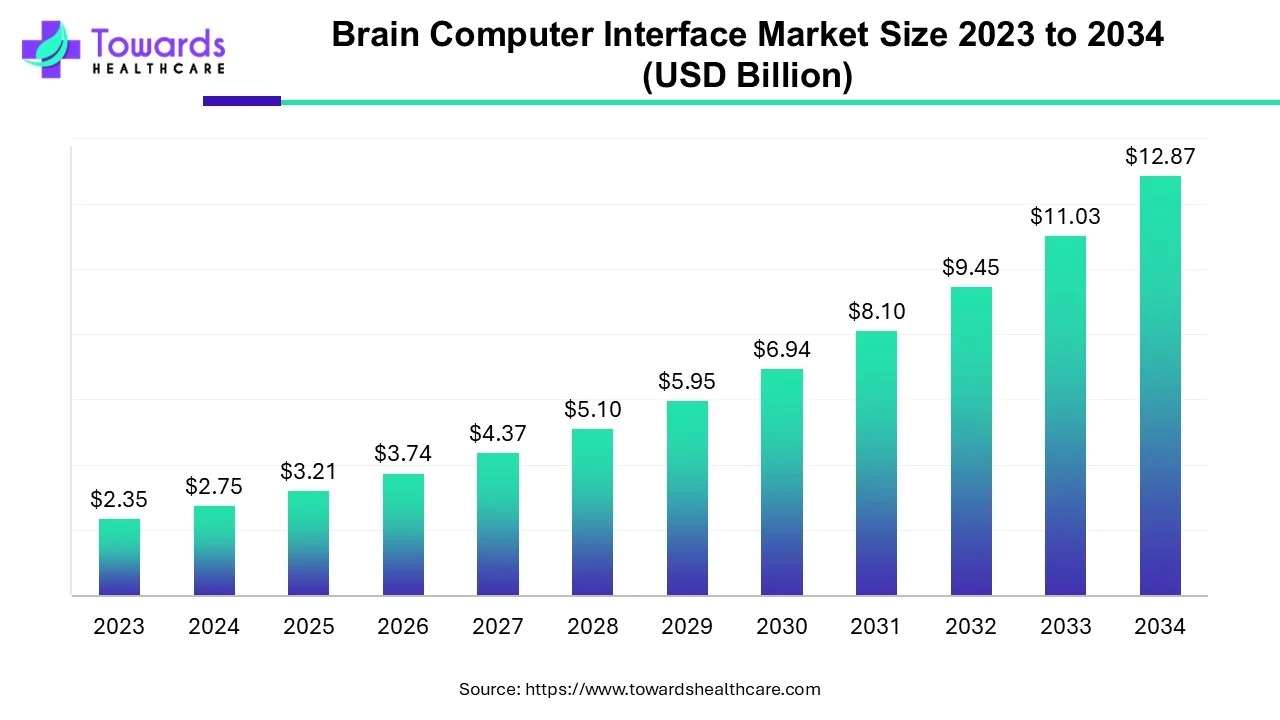Brain Computer Interface Market Companies and Trends

- Openbci
- Nihon Kohden Corporation
- Neuroky
- Natus Medical Incorporated
- Integra Lifesciences
- G.Tec Medical Enginneering Gmbh
- Emotiv
- Cortech Solutions
- Cadwell Industries
- Advanced Brain Monitoring, Inc
- Mind Technologies, Inc
- Covidien, Plc
- Compumedics, Ltd
- Cas Medical Systems
- Others
Brain-Computer Interfaces Market Overview
The brain-computer interface (BCI) market refers to the industry focused on developing and commercializing devices and systems that allow direct communication between the brain and an external device or computer. BCIs use various technologies to interpret and translate brain signals into actions, such as controlling a cursor on a screen or robotic arm. The market for BCI technology is growing rapidly due to its potential to revolutionize a wide range of fields, including medicine, gaming, and entertainment.
Some of the key drivers of growth in the BCI market include advancements in neuroscience and neuro-engineering, increased funding from governments and private investors, and the potential for BCI technology to improve the quality of life for individuals with disabilities or neurological disorders. However, there are also significant challenges facing the BCI market, including the complexity of the technology, ethical concerns around brain privacy and ownership, and regulatory hurdles. The brain-computer market is still in the early stages of development but is expected to see significant growth in the coming years as research and development continue and new applications for the technology are discovered.
An apparatus known as a brain-machine interface (BMI) converts neural information into commands that can operate external software or hardware, such as a machine or robotic arm. BMIs are frequently utilized by people with sensory or motor disabilities as assistive living tools. The initial goal of BCI technology development was to enable paralyzed persons to think-operate assistive equipment. However, new application cases are always being found. For instance, BCI can now be utilized as a training tool for neurofeedback to enhance cognitive function. BCI has potential uses in various industries and provides greater flexibility either by enhancing or replacing human peripheral functioning capacity.
Market Growth
The global brain computer interface market size is expected to increase from USD 3.21 billion in 2025 to USD 12.87 billion by 2034, growing at a CAGR of 16.7% throughout the forecast period from 2025 to 2034, as a result of the growing prevalence of neurodegenerative disorders and increasing number of gaming industries implementing BCI technologies.

Brain Computer Interface Market Trends
- In January 2025, Neuralink, a brain-computer interface company, announced the implantation of BCI in a third human. The news was shared by Neuralink CEO Elon Musk, who also announced that all three are showing promising results. The company aims to implant the devices in 20-30 more people in 2025.
- In January 2025, Synchron announced a collaboration with the NVIDIA Holoscan platform to advance its next-generation implantable BCI to redefine the possibilities of real-time neural interaction and intelligent edge processing. This will reduce system latency, bolster privacy, and provide users with a more responsive and intuitive BCI experience.
- In September 2024, Synchron announced the first use of Amazon Alexa by one of the patients implanted with Synchron’s BCI. The ALS patient was able to use his direct thoughts to control his smart home using Synchron BCI.
FDA Recent Approvals
- In May 2025, a milestone was achieved by Neuralink during its mission in transforming healthcare. The US Food and Drug Administration’s (FDA) "Breakthrough Device" designation was received by the company for its speech restoration device. This was granted under the FDA’s Breakthrough Devices Program, where it planned to accelerate the review and development of medical technologies that can offer enhancements for life-threatening or irreversibly debilitating conditions.
- In May 2025, a €4 million grant was received by the INBRAIN Neuroelectronic, which is a neurotechnology company manufacturing precision brain-computer interfaces (BCIs) powered by graphene, by the Spanish Ministry of Industry and Tourism through the PERTE Chip initiative was announced. This initiative main objective is to design and produce the semiconductor and microelectronics industry in Spain, along with the promotion of strategic technological autonomy for both Spain and the European Union. Furthermore, €53.2 million in funding was also provided by the Ministry to support 37 breakthrough projects throughout 11 autonomous communities.
- In April 2025, the core brain implant system of Precision Neuroscience received approval from the U.S. Food and Drug Administration (FDA) for limited implantation and commercial uses was announced. As per the company, this is the very first full regulatory clearance granted to a wireless BCI.
Latest Announcement by Industry Leaders
Dr. Christoph Guger, Founder and CEO of g.tec Medical Engineering commented that the company offers its solutions globally and has sales offices in the U.S., Canada, Colombia, Spain, Hong Kong, Japan, and Australia. The company’s innovative products address diverse neuroscience applications, including neurorehabilitation, brain mapping, and consciousness disorders. He also said that the company is now launching a franchise model for recoveriX, enabling entrepreneurs to establish their neurorehabilitation businesses.
Recent Developments
- In September 2024, INBRAIN Neuroelectronics announced the completion of the world’s first human procedure of its graphene-based BCI in a patient undergoing brain tumor resection. The company’s BCI technology was able to differentiate between normal and cancerous brain tissue with micrometer-scale precision.
- In August 2024, researchers from Brown University developed a brain-computer interface that translates brain signals into speech with up to 97% accuracy for patients with amyotrophic lateral sclerosis. The researchers conducted a clinical trial and found that a participant regained nearly fluent speech using BCI.
Partner with our experts to explore the Brain Computer Interface Market at sales@towardshealthcare.com
Keypoints
- Company Overview
- Locations Subsidiaries/Geographic reach
- Key Executives
- Company Financials
- Patents registered
- SWOT Analysis
- Applications Catered
- Strategic collaborations
- Recent Developments
- Competitive Benchmarking
